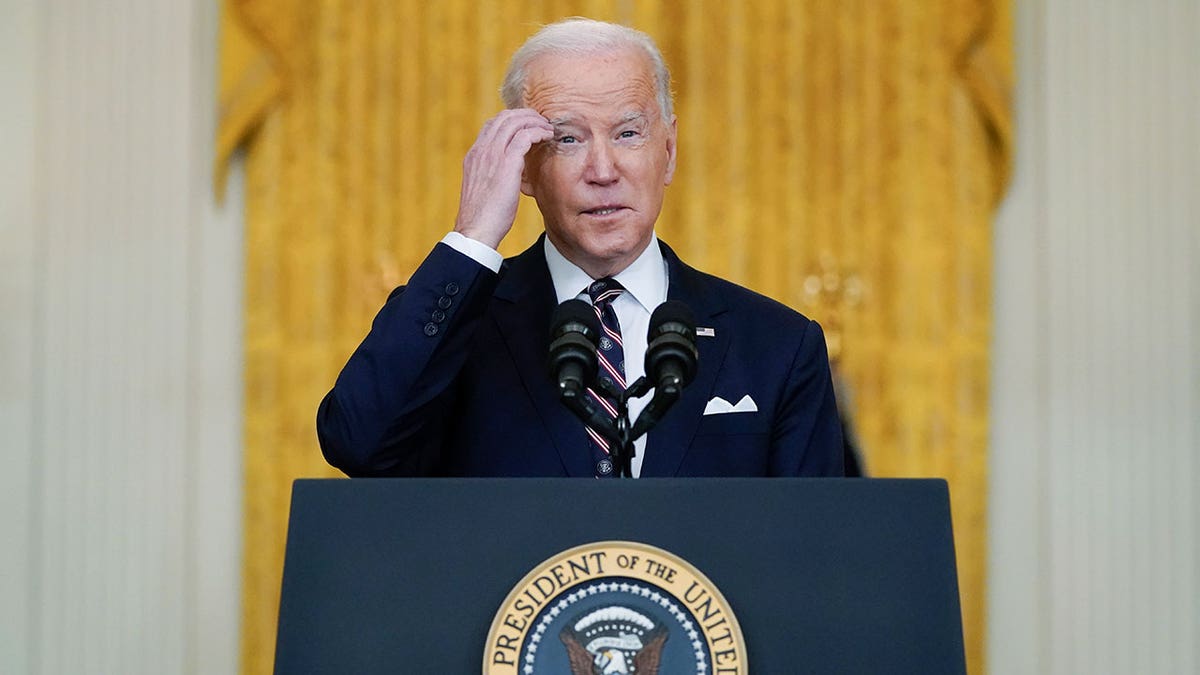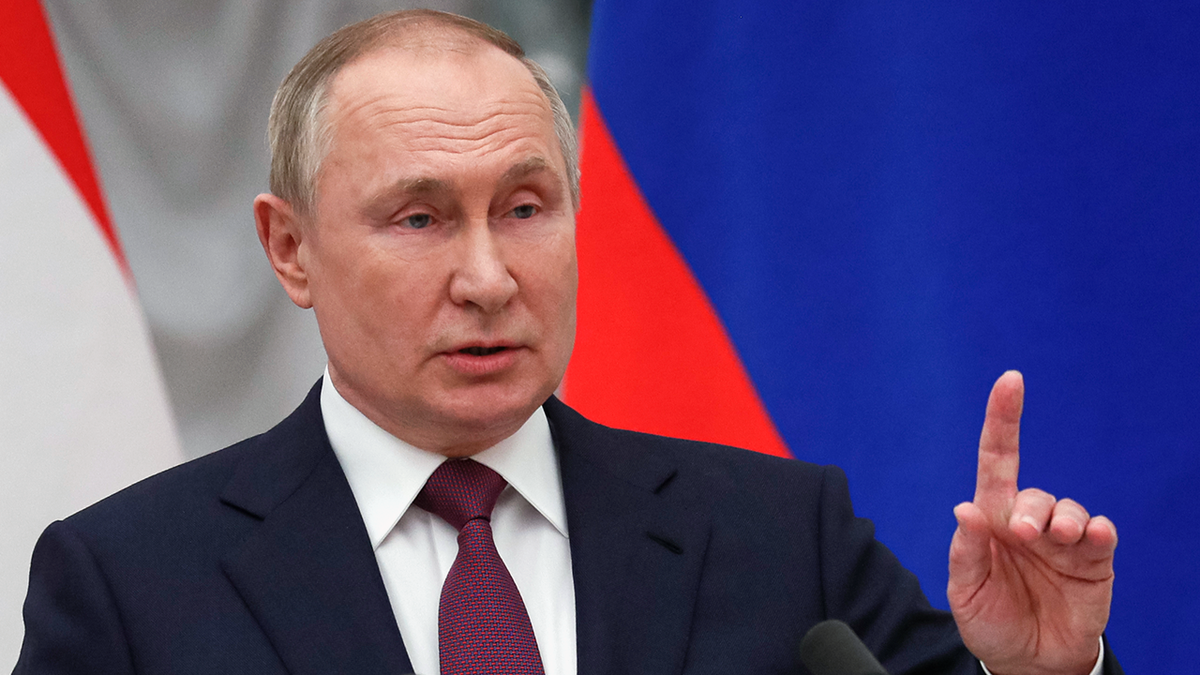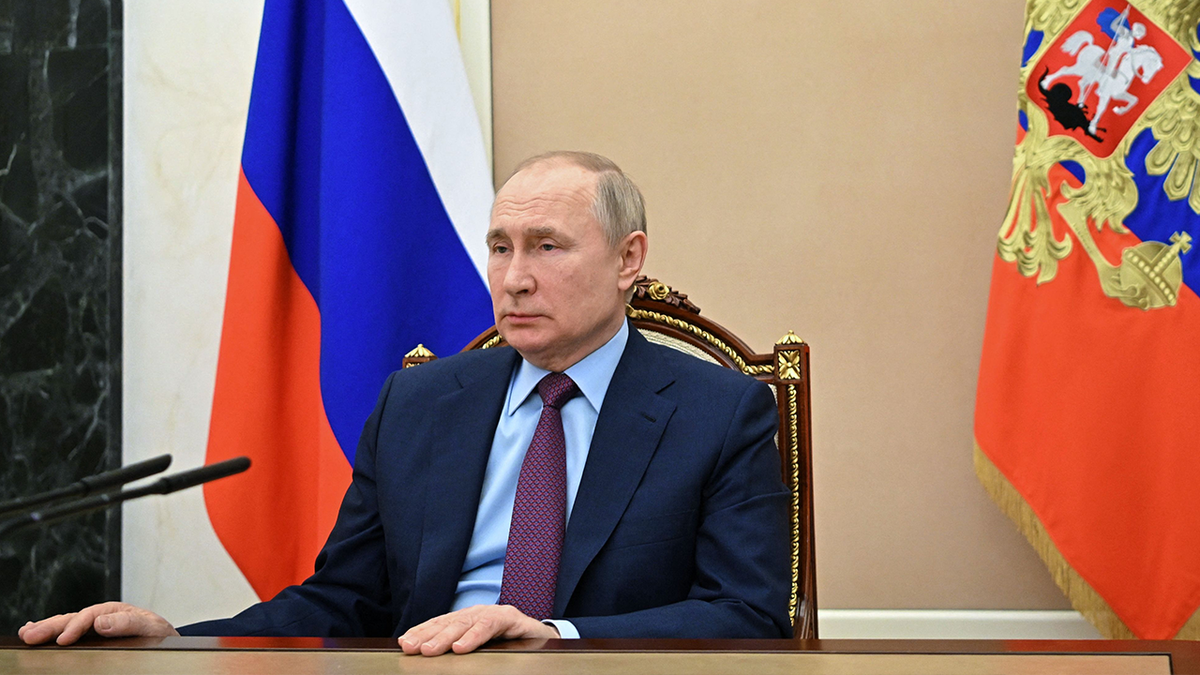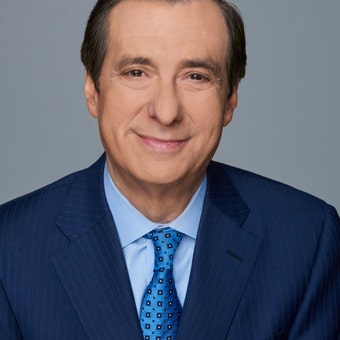Republicans criticize Biden’s handling of Russia as he announces sanctions
Fox News White House correspondent Peter Doocy discusses Biden’s announcement of sanctions for Russia and the White House’s response to media inquiries on the matter on ‘Special Report.’
War has now come to Ukraine, just as President Biden said it would.
But his measured reaction so far raises fundamental questions about whether he is delivering on his threat to make Russian President Vladimir Putin pay an extremely high price.
It is absolutely Orwellian to say that the Kremlin’s troops entering the two regions partially controlled by Russian separatists is not an invasion. It is even more absurd for Putin to claim these are "peacekeepers," one of many lies he has been spewing throughout this manufactured crisis.
Perhaps many Russians believe the fictions that he is protecting ethnic Russians from genocide or a non-existent attack by the Ukrainian government, but the world isn’t buying it. Even the notion that he’d be open to a summit meeting with Biden this week was an outright falsehood, along with his diplomatic recognition of the breakaway areas.

President Joe Biden speaks about Ukraine in the East Room of the White House (Associated Press)
Yet the White House initially refused to call Putin’s aggression an "invasion," with the deputy national security adviser using that term only when pressed by CNN. More importantly, top Biden officials made clear the move would not trigger the massive financial sanctions that the president and our NATO allies had brandished as the major deterrent for stopping Putin. And the press is highly skeptical.
Tit-for-tat diplomacy
That seems like a semantic game, a throwback to when Biden said last month that a "minor incursion" might trigger a fight among the allies over how to respond, and had to back off under considerable pressure. But imposing sanctions limited to the separatist areas is not what he had promised, just tit-for-tat diplomacy that feels unsuited to this historic challenge.
In his televised speech, Biden talked tough but embodied the same contradiction. If Putin is "carving a big chunk out of Ukraine," if he committed "a flagrant violation of international law," why the junior-league sanctions? I’m not saying they don’t have much bite, but they are a fraction of what the president said would happen if Russian troops moved in. Now he’s holding back.
Sending troops across the border of a sovereign country is an invasion, no matter the numbers or the location. Would we somehow be comforted if foreign troops landed on Long Island but didn’t march on to New York City?
As the Ukrainian foreign minister on Tuesday told Tony Blinken and the press, "An invasion is an invasion."
AN ERA OF ENDLESS DEBATES, FROM UKRAINE TO VACCINES TO RUSSIAGATE
Calling Biden's bluff
Let’s say Putin goes no further than the rebel regions. Would he dodge the more sweeping sanctions, despite the invasion, while the West breathes a sigh of relief?
"Russia has occupied these regions since 2014," a senior administration official told reporters Monday night. So what? This is an escalation, and it looks for the moment – though things could rapidly change – that Putin has called Biden’s bluff.
The former KGB agent has made no secret of his ambition to reassemble the pieces of the old Soviet Union. He utterly rewrites history by claiming that Ukraine has no right to exist.

Russian President Vladimir Putin gestures during a joint news conference with Hungary's Prime Minister Viktor Orban following their talks in the Kremlin in Moscow, Feb. 1, 2022. (Associated Press)
As The New York Times points out, he blames Lenin for creating modern Ukraine but allowing it autonomy within the Soviet empire, and Gorbachev for the "madness" of allowing the country its independence. But that is among the biggest lies of all: The Ukrainian people voted overwhelmingly for independence in a 1991 democratic referendum.
Unilaterally deciding to void the existence of a neighbor is not how civilized countries act, and suggests there is no way Putin will stop with the breakaway provinces. A failure to respond to such naked aggression would not only mean a new Cold War, but a collapse of the NATO security blanket that has kept a shaky peace since 1945.
THE BACKLASH OVER AN EXCESSIVELY WOKE DEMOCRATIC PARTY
Political fallout in US
Now to the political fallout here at home.
Some conservative pundits have backed Biden’s handling of the crisis until now, but others are ripping him as a weak and feckless leader who "allowed" this to happen. I would just ask, if you accept the notion that two nuclear powers aren’t going to be fighting a ground war in a country on Russia’s doorstep, what else could he have done?
Biden rallied the West behind crippling sanctions – keep in mind Russia’s economy is smaller than Italy’s – and warned Putin, both personally and public, that he’d pay a very heavy price for going into Ukraine. He also kept exposing the Kremlin’s false-flag claims. The president never said he could stop an invasion; indeed he kept predicting it. Mitch McConnell, for his part, simply asked Biden to "waste no time" in imposing the "devastating" sanctions.

Russian President Vladimir Putin attends a meeting with Russian Defense Minister Sergei Shoigu at the Kremlin, in Moscow, Feb. 14, 2022. (Getty Images)
One talking point on the right is that Putin seized Crimea while Barack Obama was in office, now is defying Biden in Donetsk and Luhansk, and never attempted such invasions during Donald Trump’s presidency.
SUBSCRIBE TO HOWIE'S MEDIA BUZZMETER PODCAST, A RIFF ON THE DAY'S HOTTEST STORIES
Danger ahead?
OK, that’s a fact. But it’s also a fact that Trump pursued a friendly relationship with Putin, despite some friction, arguing there was no reason for the two countries to be knee-jerk adversaries. And much of the Republican Party went along. There’s no need to get into Russian meddling in the 2016 election to conclude that Trump tried to sell Putin as a reasonable partner when history has shown he is anything but.
Don’t take my word for it. Trump on Tuesday had little but praise for Putin, along with the expected this-wouldn’t-have-happened-if-I-was-there. He called Putin’s move "genius." He called it "savvy." No expression of concern for Ukraine – which at the heart of the first impeachment, was his willingness to delay military aid while demanding dirt on Joe Biden.
CLICK HERE TO GET THE FOX NEWS APP
No one knows what the short term will bring, but I can’t escape the feeling that we’ve just embarked on a new, more volatile, more dangerous phase of world history.


